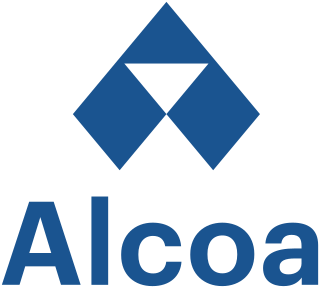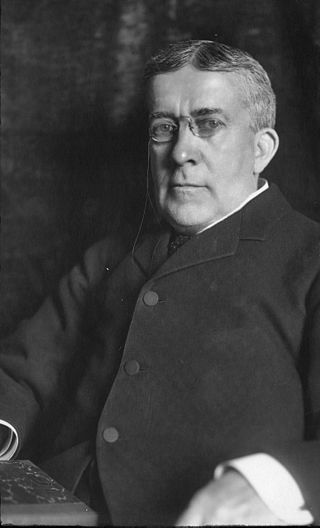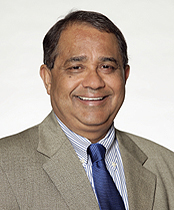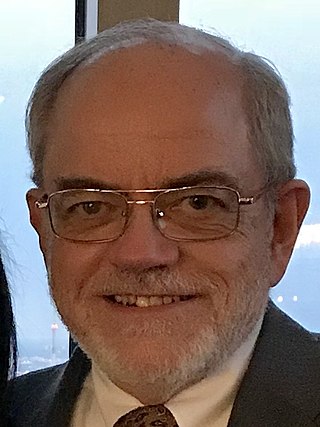
Francis Lazarro Rizzo was an American police officer and politician. He served as commissioner of the Philadelphia Police Department (PPD) from 1968 to 1971 and mayor of Philadelphia from 1972 to 1980. He was a member of the Democratic Party throughout the entirety of his career in public office. He switched to the Republican Party in 1986 and campaigned as a Republican for the final five years of his life.

Alcoa Corporation is a Pittsburgh-based industrial corporation. It is the world's eighth-largest producer of aluminum. Alcoa conducts operations in 10 countries. Alcoa is a major producer of primary aluminum, fabricated aluminum, and alumina combined, through its active and growing participation in all major aspects of the industry: technology, mining, refining, smelting, fabricating, and recycling.

ASARCO is a mining, smelting, and refining company based in Tucson, Arizona, which mines and processes primarily copper. The company has been a subsidiary of Grupo México since 1999.
Falconbridge Limited was a Toronto, Ontario-based natural resources company with operations in 18 countries, involved in the exploration, mining, processing, and marketing of metal and mineral products, including nickel, copper, cobalt, and platinum. It was listed on the TSX and NYSE (FAL), and had revenue of US$6.9 billion in 2005. In August 2006, it was absorbed by Swiss-based mining company Xstrata, which had formerly been a major shareholder.

The patio process is a process for extracting silver from ore. Smelting, or refining, is most often necessary because silver is only infrequently found as a native element like some metals nobler than the redox couple 2 H+ + 2 e−⇌ H
2 (gold, mercury, ...). Instead, it is made up of a larger ore body. Thus, smelting, or refining, is necessary to reduce the compound containing the Ag+ cation into metallic Ag and to remove other byproducts to get at pure silver. The process, which uses mercury amalgamation to recover silver from ore, was first used at scale by Bartolomé de Medina in Pachuca, Mexico, in 1554. It replaced smelting as the primary method of extracting silver from ore at Spanish colonies in the Americas. Although some knowledge of amalgamation techniques were likely known since the classical era, it was in the New World that it was first used on a large industrial scale. Other amalgamation processes were later developed, importantly the pan amalgamation process, and its variant, the Washoe process. The silver separation process generally differed from gold parting and gold extraction, although amalgamation with mercury is also sometimes used to extract gold. While gold was often found in the Americas as a native metal or alloy, silver was often found as a compound such as silver chloride and silver sulfide, and therefore required mercury amalgamation for refinement.
Ashland Inc. is an American chemical company headquartered in Wilmington, Delaware. The company traces its roots back to the city of Ashland, Kentucky, where it was headquartered from 1924 to 1999. The company has five wholly owned divisions, which include Chemical Intermediates and Solvents, Composites, Industrial Specialties, Personal and Home Care, & Pharmaceuticals, Food and Beverage, and Agriculture. Until 2017, the company was the primary manufacturer of Valvoline.
Boliden AB is a Swedish multinational metals, mining, and smelting company headquartered in Stockholm. The company produces zinc, copper, lead, nickel, silver, and gold, with operations in Sweden, Finland, Norway, and Ireland.

La Oroya is a city on the River Mantaro and capital of the Yauli Province, located in the Department of Junin in central Peru. It is situated on the eastern watershed of the Andes at an altitude of 3,745 m, some 176 km east-north-east of the national capital, Lima. La Oroya is the location of a smelting operation that earned the town a place on the Blacksmith Institute's 2007 report on "The World's Worst Polluted Places". It is also the eastern endpoint of the Central Highway of Peru.

Jiangxi Copper is the largest copper producer in Mainland China. Its operations include copper mining, milling, smelting and refining to produce copper-related products, including pyrite concentrates, sulfuric acid and electrolytic gold and silver. Its chairman is Mr.Zheng Gaoqing and its headquarters is at Nanchang, Jiangxi, China.

Charles Custis Harrison was an American businessman who owned several sugar refineries in Philadelphia from 1863 to 1892, and served as Provost of the University of Pennsylvania from 1894 to 1910.

Trail is a city in the West Kootenay region of the Interior of British Columbia, Canada. It was named after the Dewdney Trail, which passed through the area. The town was first called Trail Creek or Trail Creek Landing, and the name was shortened to Trail in 1897.
The Boston and Montana Consolidated Copper and Silver Mining Company was a mining, smelting, and refining company which operated primarily in the state of Montana in the United States. It was established in 1887 and merged with the Amalgamated Copper Company in 1901. The Amalgamated Copper Company changed its name to Anaconda Copper in 1910, and became one of America's largest corporations. Historian Michael P. Malone has written, "Well financed and well managed, the Boston and Montana came to rank among the world's greatest copper companies."

Subodh Kumar Das is a scientist, engineer, and inventor who works in the aluminum industry. He is the founder and CEO of Phinix, LLC, an international consulting firm serving the aluminum industry. Previously, Das has served on the boards of The Aluminum Association, SECAT, Inc., and the Minerals, Metals and Materials Society. The American Society of Metals elected him as ASM Fellow in 2002. The Minerals, Metals and Materials Society also awarded Das its prestigious Distinguished Service Award in 2001. He was also awarded the JOM Best Paper Award in 2011.

There is a long history of women in dentistry. Women are depicted as assistant dentists in the middle ages. Prior to the 19th century, dentistry was largely not yet a clearly defined and regulated profession with formal educational requirements. Individual female dentists are known from the 18th century. When the profession was regulated in the 19th century, it took a while before women achieved the formal education and permission to engage in dentistry.
Thomas A. "Buck" Riley is an American attorney and member of the Republican Party. He served as Chairman of the Pennsylvania Convention Center Authority Board from 2007 to 2011.
Great Eastern Conventions, Inc. was an entertainment company that produced comic book conventions, most actively during the years 1987-1996. In New York City, the Great Eastern shows filled the gap between the mid-1980s demise of the annual Comic Art Convention and Creation Conventions, and the establishment of promoter Michael Carbonaro's annual Big Apple Comic Con in 1996. From 1993 to 1995, Great Eastern hosted two New York City shows annually at the Jacob K. Javits Convention Center. In addition to running shows in the Northeastern United States, Great Eastern also ran shows in Georgia, Florida, California, Oregon, Minnesota, and Texas.

The 1951 Philadelphia municipal election, held on Tuesday, November 6, was the first election under the city's new charter, which had been approved by the voters in April, and the first Democratic victory in the city in more than a half-century. The positions contested were those of mayor and district attorney, and all seventeen city council seats. There was also a referendum on whether to consolidate the city and county governments. Citywide, the Democrats took majorities of over 100,000 votes, breaking a 67-year Republican hold on city government. Joseph S. Clark Jr. and Richardson Dilworth, two of the main movers for the charter reform, were elected mayor and district attorney, respectively. Led by local party chairman James A. Finnegan, the Democrats also took fourteen of seventeen city council seats, and all of the citywide offices on the ballot. A referendum on city-county consolidation passed by a wide margin. The election marked the beginning of Democratic dominance of Philadelphia city politics, which continues today.

Henry Washington Sawyer III was an American lawyer, civil rights activist and politician. Born in Philadelphia, he served in the U.S. Navy in World War II, afterwards returning to the University of Pennsylvania Law School. Sawyer worked as a corporate lawyer but is best known for his advocacy of civil liberties, especially in First Amendment cases. In Abington School District v. Schempp and Lemon v. Kurtzman, he successfully argued cases on behalf of the American Civil Liberties Union before the Supreme Court of the United States that became the basis for all modern Establishment Clause jurisprudence. Sawyer also pursued civil rights causes in Philadelphia and in the South during the civil rights movement of the 1960s. Originally a Republican, he was elected as a Democrat to serve a four-year term on the Philadelphia City Council, where he worked for civil service reform and to increase the amount of public art in the city.

David Fair is an American activist who has been a leader in the labor, LGBT, AIDS, homeless and child advocacy movements in Philadelphia, PA since the 1970s. He has founded or co-founded several advocacy and service organizations, including the Philadelphia Lesbian and Gay Task Force (1977), the Philadelphia Gay Cultural Festival (1978), Lavender Health (1979), the Philadelphia/Delaware Valley Union of the Homeless (1985), Philly Homes 4 Youth (2017), and the Philadelphia Coalition on Opioids and Children (2018), and led the creation of numerous local government health and human service initiatives, including the AIDS Activities Coordinating Office for the Philadelphia Department of Public Health (1987) and the Division of Community-Based Prevention Services (2001), the Parenting Collaborative (2003), and the Quality Parenting Initiative (2014) for the Philadelphia Department of Human Services.

Austin Andrew Meehan, Sr., was a Republican politician in Philadelphia who served as county sheriff. Before entering politics, Meehan ran his family's paving business and was known as a local basketball star. Beginning as an insurgent within the city's Republican Party, he soon won the favor of party bosses and climbed the ranks of Philadelphia's Republican organization. Meehan served two terms as county sheriff from 1944 to 1952 and was recognized as the unofficial head of the Republican Party in Philadelphia in the 1950s. He remained an influential party member until his death in 1961. He was the father of Billy Meehan.














